|
Solving problems that occur between two congregations, or between the a member from one congregation and a member from another can be tricky at times. Brother Greg Gay helps navigate the challenges of intra-congragational problems by shedding the light of Scripture upon them.
0 Comments
It has recently been suggested by some that what I have taught regarding the necessity of repentance as a condition of forgiveness (as is taught in Luke 17:3-4) is a "New Doctrine" and "dangerous." I share the following quote from Guy N. Wood's book Questions and Answers Volume 1 (published in 1976) to demonstrate that what I have taught is certainly nothing "New". Guy N. Woods does an excellent job in a brief space of addressing some common objections to the necessity of repentance in the granting of forgiveness. Please consider carefully. Is it our duty to forgive those who sin against us when they neither ask for nor want forgiveness? To this brief article I would add one caveat of correction: It would seem that God does hold a bit of revengeful feelings toward unrepentant sinners: 2 Thessalonians 1:5-10 Brother Jonathan Edwards is an evangelist and a licensed counselor who takes the time to share with us real world applications of God's mandate to defend the helpless. We highly recommend this presentation and hope you will consider sharing it with others. In his first letter to the Corinthians, Paul chastised the leaders at Corinth for lacking the wisdom necessary to judge trivial cases that caused disputes among brethren: 1 Corinthians 6:2-5 Or do you not know that the saints will judge the world? And if the world is to be judged by you, are you incompetent to try trivial cases? Do you not know that we are to judge angels? How much more, then, matters pertaining to this life! So if you have such cases, why do you lay them before those who have no standing in the church? I say this to your shame. Can it be that there is no one among you wise enough to settle a dispute between the brothers? If we are to walk in wisdom and honor God by properly dealing with conflicts that arise in the church, we must consider the following principles of judgment:  Proverbs 31:9 Open your mouth, judge righteously, defend the rights of the poor and needy. John 7:24 Do not judge by appearances, but judge with right judgment.” Not only is judgment a requirement, but it is essential for the administration of both justice and mercy. James 5:19-20 My brothers, if anyone among you wanders from the truth and someone brings him back, let him know that whoever brings back a sinner from his wandering will save his soul from death and will cover a multitude of sins. Isaiah 1:16-17 Wash yourselves; make yourselves clean; remove the evil of your deeds from before my eyes; cease to do evil, learn to do good; seek justice, correct oppression; bring justice to the fatherless, plead the widow’s cause. Fighting evil, upholding justice, and demonstrating mercy all require leaders to pass judgment. One of the worst things that can be done by leaders when they encounter evil is to fail to act. We MUST JUDGE and we MUST ACT. Ephesians 5:11-14 Take no part in the unfruitful works of darkness, but instead expose them. For it is shameful even to speak of the things that they do in secret. But when anything is exposed by the light, it becomes visible, for anything that becomes visible is light. When we encounter evil we must judge it for what it is and bring it into the light so that righteousness and justice can flow from the throne of God. 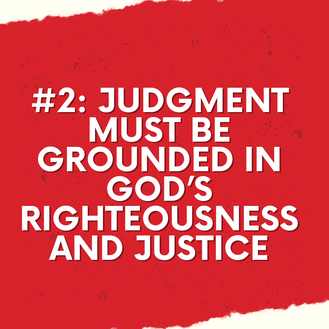 Psalm 89:14 Righteousness and justice are the foundation of your throne, steadfast love and faithfulness go before you. Psalm 97:2-3 Clouds and thick darkness are all around him; righteousness and justice are the foundation of his throne. Fire goes before him and burns up his adversaries all around. This passage is teaching that righteous justice (righteousness + justice) must be understood as the foundation of God's reign. The reason righteous justice must be foundational is because without an understanding of right and wrong the concept of mercy and punishment become meaningless and arbitrary. If we are to show true mercy, we must understand God's standard of righteousness and justice. As one man put it, "Right is right even when no one is doing it, and wrong is wrong even if everyone is doing it." Matthew 23:23 “Woe to you, scribes and Pharisees, hypocrites! For you tithe mint and dill and cumin, and have neglected the weightier matters of the law: justice and mercy and faithfulness. These you ought to have done, without neglecting the others. 2 Chronicles 19:5-7 [5] He appointed judges in the land in all the fortified cities of Judah, city by city, and said to the judges, “Consider what you do, for you judge not for man but for the LORD. He is with you in giving judgment. Now then, let the fear of the LORD be upon you. Be careful what you do, for there is no injustice with the LORD our God, or partiality or taking bribes.” While it is true that we do not posses the omniscience of God, such is not require to enact righteousness and justice. Since we can understand God's Word, and since His Word equips us for "every good work" (2 Timothy 3:17) and "all things that pertain to life and Godliness" (2 Peter 1:3), we can rest assured that our judgments are righteous and just if they are grounded in His Word. It is a false argument to claim that since we are fallible humans we cannot therefore ever understand or apply either righteousness of justice. If we cannot understand or apply the principles of righteousness or justice, neither can we apply to principles of love and mercy for love and mercy are inseparably tied to righteousness and justice. Deuteronomy 16:19-20 [19] You shall not pervert justice. You shall not show partiality, and you shall not accept a bribe, for a bribe blinds the eyes of the wise and subverts the cause of the righteous. [20] Justice, and only justice, you shall follow, that you may live and inherit the land that the LORD your God is giving you.  1 Samuel 16:7 But the Lord said to Samuel, “Do not look on his appearance or on the height of his stature, because I have rejected him. For the Lord sees not as man sees: man looks on the outward appearance, but the Lord looks on the heart.” Since we are not omniscient (see point 2) we do not have the ability to judge the hearts of men; we are only able to judge their outward appearance - their actions. In matters of judgment we as humans must therefore stick to that which can be seen. Matthew 7:16-18 You will know them by their fruits. Do men gather grapes from thornbushes or figs from thistles? Even so, every good tree bears good fruit, but a bad tree bears bad fruit. A good tree cannot bear bad fruit, nor can a bad tree bear good fruit.  Matthew 7:1-5 Judge not, that you be not judged. For with what judgment you judge, you will be judged; and with the measure you use, it will be measured back to you. And why do you look at the speck in your brother’s eye, but do not consider the plank in your own eye? Or how can you say to your brother, ‘Let me remove the speck from your eye’; and look, a plank is in your own eye? Hypocrite! First remove the plank from your own eye, and then you will see clearly to remove the speck from your brother’s eye. Jesus teaching is not meant to condemn all forms of judgment, but rather condemns hypocritical judgment. In other words, we must realize that God’s Word applies to us just as much as it does to everyone else, so we must be careful to walk in righteousness before we pass judgment on others. Illustration: Parable of the Tenants Matthew 21:40-41, 43-45 When therefore the owner of the vineyard comes, what will he do to those tenants?” They said to him, “He will put those wretches to a miserable death and let out the vineyard to other tenants who will give him the fruits in their seasons... Therefore I tell you, the kingdom of God will be taken away from you and given to a people producing its fruits. And the one who falls on this stone will be broken to pieces; and when it falls on anyone, it will crush him.” When the chief priests and the Pharisees heard his parables, they perceived that he was speaking about them.  Matthew 7:12 “So whatever you wish that others would do to you, do also to them, for this is the Law and the Prophets." If we would but follow this instruction our senses of righteousness, justice, and mercy would increase tenfold.  1 Corinthians 5:12-13 For what have I to do with judging outsiders? Is it not those inside the church whom you are to judge? God judges those outside. “Purge the evil person from among you.” First, this passage teaches that we must make a distinction (judgment) between "insiders" and "outsiders." The reason for drawing a distinction between insiders and outsiders is because one group (insiders) must be disciplined when they sin ("purge this evil person from among you!) while the same discipline is explicitly forbidden on members of the "outsiders" group (the world - non-Christians).  While it is true that a single sin of any type can send a person to hell, the idea that all sins are equal is contradicted in Scripture: John 19:11 Jesus answered, “You could have no power at all against Me unless it had been given you from above. Therefore the one who delivered Me to you has the greater sin.” Matthew 11:21-22 “Woe to you, Chorazin! Woe to you, Bethsaida! For if the mighty works done in you had been done in Tyre and Sidon, they would have repented long ago in sackcloth and ashes. But I tell you, it will be more bearable on the day of judgment for Tyre and Sidon than for you. 1 Corinthians 5:1-2 It is actually reported that there is sexual immorality among you, and of a kind that is not tolerated even among pagans, for a man has his father’s wife. And you are arrogant! Ought you not rather to mourn? Let him who has done this be removed from among you. Revelation 21:8 But as for the cowardly, the faithless, the detestable, as for murderers, the sexually immoral, sorcerers, idolaters, and all liars, their portion will be in the lake that burns with fire and sulfur, which is the second death.” Proverbs 6:16-19 There are six things that the LORD hates, seven that are an abomination to him: haughty eyes, a lying tongue, and hands that shed innocent blood, a heart that devises wicked plans, feet that make haste to run to evil, a false witness who breathes out lies, and one who sows discord among brothers.  This principle is brought out clearly in the Old Testament wherein some sin, but not all, not even most, were punished with the death penalty while others were not. It also explains why parents hand out different punishments to their children when their children disobey. One of the overarching principles of justice is that the punishment must fit the crime. Luke 12:47-48 And that servant who knew his master’s will, and did not prepare himself or do according to his will, shall be beaten with many stripes. But he who did not know, yet committed things deserving of stripes, shall be beaten with few. For everyone to whom much is given, from him much will be required; and to whom much has been committed, of him they will ask the more. Matthew 18:5-6 “Whoever receives one such child in my name receives me, but whoever causes one of these little ones who believe in me to sin, it would be better for him to have a great millstone fastened around his neck and to be drowned in the depth of the sea. Matthew 12:31-32 [31] Therefore I tell you, every sin and blasphemy will be forgiven people, but the blasphemy against the Spirit will not be forgiven. [32] And whoever speaks a word against the Son of Man will be forgiven, but whoever speaks against the Holy Spirit will not be forgiven, either in this age or in the age to come. James 3:1 My brethren, let not many of you become teachers, knowing that we shall receive a stricter judgment.  There is much confusion that surrounds matters of judgment because of a failure to understand the teaching of 1 Corinthians 6. 1 Corinthians 6:2, 5-8 Or do you not know that the saints will judge the world? And if the world is to be judged by you, are you incompetent to try trivial cases? I say this to your shame. Can it be that there is no one among you wise enough to settle a dispute between the brothers, but brother goes to law against brother, and that before unbelievers? To have lawsuits at all with one another is already a defeat for you. Why not rather suffer wrong? Why not rather be defrauded? But you yourselves wrong and defraud—even your own brothers! What is being prohibited in 1 Corinthians 6 is taking trivial matters that have caused disputes between brethren and asking the world to sort out such church problems. It is shameful when trivial matters of the church are drug before the world and place Christianity in a bad light. And yet the same inspired recorded aired out Corinth's church problems in a public record so that truth could be upheld and an example of setting problems straight could be given to the church at large. It is shameful when sin exists within the church, this is true, but it is more shameful when the church refuses to address the sin - or even goes so far as to attempt cover it up. The trivial matters i 1 Corinthians 6, and how the church is supposed to deal with them MUST NOT be confused with the issues of criminality that are addressed in Romans 13. Trivial issues and acts of criminality are two drastically different categories of sin. God has appointed wise men within the church to deal with the trivial matters, and He has appointed Civil Authorities to address issues of criminality. Romans 13:1-6 Let every person be subject to the governing authorities. For there is no authority except from God, and those that exist have been instituted by God. Therefore whoever resists the authorities resists what God has appointed, and those who resist will incur judgment. For rulers are not a terror to good conduct, but to bad. Would you have no fear of the one who is in authority? Then do what is good, and you will receive his approval, for he is God’s servant for your good. But if you do wrong, be afraid, for he does not bear the sword in vain. For he is the servant of God, an avenger who carries out God’s wrath on the wrongdoer. Therefore one must be in subjection, not only to avoid God’s wrath but also for the sake of conscience. For because of this you also pay taxes, for the authorities are ministers of God, attending to this very thing.  Romans 2:9-11 [9] There will be tribulation and distress for every human being who does evil, the Jew first and also the Greek, [10] but glory and honor and peace for everyone who does good, the Jew first and also the Greek. [11] For God shows no partiality. Deuteronomy 1:16-17 Hear the cases between your brethren, and judge righteously between a man and his brother or the stranger who is with him. You shall not show partiality in judgment; you shall hear the small as well as the great; you shall not be afraid in any man’s presence, for the judgment is God’s. The case that is too hard for you, bring to me, and I will hear it.’ When we think of partiality we often think of it in positive terms (favoritism) and yet partiality also includes negative concepts (prejudice). In matters of judgment we must not show favoritism to those we like or prejudice against those we dislike. Furthermore, we must understand that no one is above being judged. Preachers, elders, family members, friends, and enemies are all capable of sinning, are all subject to judgment, and all deserve justice. Partiality is wickedness that perverts both justice and mercy and has no place in the Christian's life. One of the reasons partiality becomes a problem is because the fear of man/men enters the equation. There are thus many statements in Scripture that warn against the fear of man: Psalm 56:10-11 [10] In God, whose word I praise, in the LORD, whose word I praise, [11] in God I trust; I shall not be afraid. What can man do to me? Ecclesiastes 12:13 The end of the matter; all has been heard. Fear God and keep his commandments, for this is the whole duty of man. Fear belongs to God alone. To fear man is to take that which belongs to God and give it to another - that is the very definition of idolatry. DO NOT FEAR MAN.  One of the most critical principles of judgment is the Law of Two or Three Witnesses: Matthew 18:16, 20 But if he does not listen, take one or two others along with you, that every charge may be established by the evidence of two or three witnesses…For where two or three are gathered together in My name, I am there in the midst of them.” Warning: It is both sinful and foolish to reject the faithful testimony of witnesses. To stand against the evidential testimonies of two or three faithful witnesses is to stand against God. Deuteronomy 19:15-19 “A single witness shall not suffice against a person for any crime or for any wrong in connection with any offense that he has committed. Only on the evidence of two witnesses or of three witnesses shall a charge be established. If a malicious witness arises to accuse a person of wrongdoing, then both parties to the dispute shall appear before the LORD, before the priests and the judges who are in office in those days. The judges shall inquire diligently, and if the witness is a false witness and has accused his brother falsely, then you shall do to him as he had meant to do to his brother. So you shall purge the evil from your midst.
2 Corinthians 13:1-2 This is the third time I am coming to you. Every charge must be established by the evidence of two or three witnesses. I warned those who sinned before and all the others, and I warn them now while absent, as I did when present on my second visit, that if I come again I will not spare them."  Galatians 6:7 Do not be deceived, God is not mocked; for whatever a man sows, that he will also reap. Matthew 7:2 For with what judgment you judge, you will be judged; and with the measure you use, it will be measured back to you. 1 Timothy 5:24-25 The sins of some people are conspicuous, going before them to judgment, but the sins of others appear later. So also good works are conspicuous, and even those that are not cannot remain hidden. Numbers 32:23 But if you will not do so, behold, you have sinned against the LORD, and be sure your sin will find you out.  Proverbs 11:14 Where there is no guidance, a people falls, but in an abundance of counselors there is safety. Proverbs 12:17 Whoever speaks the truth gives honest evidence, but a false witness utters deceit. Proverbs 17:15 He who justifies the wicked and he who condemns the righteous are both alike an abomination to the LORD. Proverbs 18:1 [1] Whoever isolates himself seeks his own desire; he breaks out against all sound judgment. Proverbs 18:5 It is not good to be partial to the wicked or to deprive the righteous of justice. Proverbs 18:13 If one gives an answer before he hears, it is his folly and shame. Proverbs 18:17 The one who states his case first seems right, until the other comes and examines him. Matthew 7:6 [6] “Do not give dogs what is holy, and do not throw your pearls before pigs, lest they trample them underfoot and turn to attack you. Matthew 10:16 “Behold, I am sending you out as sheep in the midst of wolves, so be wise as serpents and innocent as doves.  In the end, justice will prevail. Take comfort in that fact when you are wronged, and keep it ever before you when you judge. Hebrews 10:30-31 For we know him who said, “Vengeance is mine; I will repay.” And again, “The Lord will judge his people.” It is a fearful thing to fall into the hands of the living God. 2 Corinthians 5:10-11 For we must all appear before the judgment seat of Christ, so that each one may receive what is due for what he has done in the body, whether good or evil. Therefore, knowing the fear of the Lord, we persuade others. Sexual abuse is a sin that most would rather pretend does not exist. It's easier to go through life not having to peer into the depraved abyss that is sexual abuse and witness all the trauma and havoc the devil has caused. By rejecting God's law in the garden, man unleashed unmitigated evil that he will forever have to deal with whether he wants to or not. There are two ways to cope with the reality of evil: You can bury your head in the sand and pray that it never reaches your door, or you can learn to be "wise as serpents and harmless as doves." (Matthew 10:16) The first approach leaves you vulnerable and helpless; the second will make you uncomfortable and yet better prepared for when (not if) you are confronted by Satan. There is a naive attitude that thinks sexual abuse only happens "out there" in non-Christian homes or in dangerous places rather than "in here" within the safety of our homes and churches, but that attitude does not align with reality. Truth is, research tells us that 1 in 3 girls will experience sexual abuse before they turn 18, as will 1 in every 6 boys (Ingraham et al., 2017). Those numbers are staggering yet may not even represent the actual reality as most experts agree that there is underreporting with boys. The point of this post is not to offer grand sweeping solutions to the problems of evil and suffering; the purpose is to provide a raw look at reality from the eyes of a person who has been sexually abused. WARNING: In the following video you will hear the uncensored testimony of Kyle Stephens. If you are a sexual abuse victim the content will likely be triggering. Ms. Stephens recounts in detail the sexual abuse she endured as a child at the hands of Larry Nassar (the chief medical doctor for the USA Women's Gymnastics team and doctor at Michigan State University) and how that abuse changed her life. The testimony is raw, disturbing, and powerful. There are three points viewers need to keep in mind: First, this is what sexual abuse looks like and how if affects people. Ms Stephen's testimony is disturbing and needfully so. Second, the effects of secondary trauma (as illustrated in Kyle's testimony) are nearly as bad as primary trauma (and some victims would argue even worse). Sexual abuse is therefore more like a process than a single event. Third, the effort it takes for victims to relive their pain in the pursuit of justice on their behalf or that of others is nothing short of heroic. The next video contains the testimony of the final witness in the same trial, Rachael Denhollander. Ms. Denhollander does a tremendous job laying out the parameters of justice and forgiveness. She was one of the key witnesses who lead the charge and made the whole trial possible. Without her efforts it is unclear whether or not Mr. Nassar would have been brought to justice. There is a reason Ms. Denhollander was voted one of the Top 100 most influential people in the world in 2018. If you want to read more about the life and trials of this remarkable woman, pick up a copy of her book, What Is A Girl Worth? Following Ms. Denhollander's closing statement and before he was sentenced by the judge, Mr. Nassar read his own statement. Here is his apology: As sorry and remorseful as Mr. Nassar might appear, the judge exposed his feigned remorse for what it was before issuing his sentence. What the judge did that day was truly remarkable and provides incredible insights into the depraved levels of deception employed by predators and the heinous nature of their character. Let the judge's words stand as a warning of caution if you ever have to confront or choose to defend a known predator. The justice that was witnessed in the Nassar trials is unfortunately not how things typically end. Unfortunately only 1 in 10 cases of abuse get reported and out of those cases only 3% reach a conviction. The fact is, we live in a broken system. I say that to say, just because a person is not convicted does not mean that they are not a sexual predator, nor does it mean there should not be any boundaries placed around them or consequences for their actions. Should sexual predators be forgiven by their victims? If they repent, yes. God is willing to forgive all sin and to cleanse from unrighteousness (1 John 1:8-9) if we will but confess and repent, and He expects us to do the same (Luke 17:3-4). Does that mean the past crimes of sexual predators should be forgotten and all consequences removed? Never. Amos 5:24 Take away from me the noise of your songs; to the melody of your harps I will not listen. But let justice roll down like waters, and righteousness like an ever-flowing stream. Ingraham, D., Davis, A. P. O. E. R., & Davis, R. (2017). Tear down this wall of silence: Dealing with Sexual Abuse in Our Churches (an Introduction for Those Who Will Hear).
Mike Criswell has contacted me and demanded that the following edits be made to the original post presented below - so we will post his three-fold request as follows: 1."Brother Battey, in the interest of honesty and integrity I'd like you to amend your claim that my short article was a critique of your Preachers Study presentation. I have not heard that presentation and was unaware of its publication. I did hear a sermon you gave on a similar topic on YouTube but my thoughts were not a review of your position." Brother Criswell's post was not clear as to which video he was addressing (since both video's contain much of the same material) and I assumed he had watched the video of my Preacher's Study presentation since it had more recently been published. Turns out I was wrong and he was referring t0 the following video: Brother Criswell wrote, "Brother, I would encourage you in the future to be more careful in your assertions." Brother Criswell objects to both my connecting him with my Preacher's Study presentation and labeling his post a "review" since a review would have been more thorough. So, I apologize for connecting him with my Preacher's Study presentation and mislabeling his post. Brother Criswell has informed me that he has updated his original post, but I have chosen not to post the updated version for two reasons: First, I am blocked from Brother Criswell's profile and cannot see the changes he has made and cannot therefore update what he has written. Second, in a private email he stated, "It's certainly up to you but if you want you can post the newer version. It's virtually the same content. Just a few changed sentences here and there." I apologize for asserting that he was reviewing my Preacher's Study presentation, a presentation that more fully dealt with that which upset Brother Criswell, a presentation that more fully addresses his points of objection, and a presentation which he would also strongly disagree with. I guess what I am apologizing for is asserting that he was attacking the greater of two evils, when in fact he was attacking the lesser. 2. Brother Criswell stated that I need to "be more ethical in asking permission before lifting a private article from the internet." As can be seen in the photo above, his post was set to "Public" as is indicated by the picture of the globe at the top of his post. This means that anyone in the world with a Facebook account can see what he posted - except for people like me whom he has specifically blocked. I have therefore not acted unethically in sharing his post or offering comment on it - I have rather simply address a post that was about me. Brother Criswell went on to state, "Thank you, however, for sharing my article. All you needed to do was ask!" Since he clearly posted publicly, cried out for brethren to “wake up- not woke up”, and would have apparently given me permission to post what he had written even if it had been written privately, I fail to see why he is upset or considers what I did unethical. 3. Brother Criswell wishes to clarify, "Had my essay been a review of your position it would have included a critique of your marriage of the Kingdom with the "social gospel" of the early 20th century." I honestly have no clue what he is talking about. You can listen to both my When Sexual Abuse Is Found In You Church presentation or my Preacher's Study presentation and you will not find traces of the Social Gospel in either presentation. Watch them for yourself. In a private email Brother Criswell spoke more to this concern by stating: "One thing that did concern me was that the last 15 minutes or so of your sermon sounded like you were preaching something that might have been a part of the "social gospel" movement of the early 20th century. I see very little difference in what was said and the promotion of "women's suffrage" or any number of other social issues that the "church" (broadly speaking) tried to rectify in the early 20th century. I do agree with you that sinners should not be hidden by the Lord's body. But, given the mission of the church is not secular the only thing we are authorized to do is report offenders and let the legal establishment deal with it. The Social Gospel, historically speaking, created a mess for Christianity and we are still try to deal with what it spawned. The mission of Christ was never social justice. Neither was the mission of the early church. Just something to consider in all of this." I hope sharing this lengthier quote is not unethical of me; I share it for the sake of clarifying his public statement. I do not understand how preaching about sin that happens within the body of Christ is the same as preaching the "Social Gospel". I have not, nor will I ever teach that it is the mission on the church to get involved in the social justice movements of this world. What I do preach, and will continue to preach, is that the church MUST expose sin (Ephesians 5:11) and to try to change the world with the gospel. Please listen to the last 15 minutes of my When Sexual Abuse Is Found In Your Church presentation and help me understand what he is labeling the "social gospel". I have not tried to misrepresent Brother Criswell in any way and have thus allowed his comment to be posted at the end of this article as per his request. I have left the remainder of the post unchanged so that readers can tell what was originally stated in this article and where Brother Criswell has issued objections. Without further comment, here is my original post: At the 2023 Preacher’s Study I was asked to present on the topic of Forgiveness and the relationship between forgiveness and repentance. I asked if I could address the topic of forgiveness in relation to the topic of ethics and the brethren in charge of the Study obliged. I enjoyed the work that went into my presentation and hope that the material I presented was first and foremost Biblical, that it glorified God and His Word, and that it benefits His people. I knew going into the Study that there is disagreement on the subject of forgiveness, even though it is a foundational doctrine of Christianity, and I knew that not all would agree with me. The following is a review from one preacher who has listened to my presentation (at least in part) and posted his thoughts publicly on social media. His review was forwarded to me by several brethren as I am currently blocked by this reviewer and am unable to see anything he posts. I don’t feel that the review I have just shared is a fair assessment of what I presented, but I will allow you the readers of this post to watch the presentation for yourself and weigh what I have taught on its own merits and in light of God’s word. I am open to criticism, and do not object to brethren disagreeing with me, or addressing publicly what I have taught publicly (as is demonstrated by my willingness to present in a public format where any man in the audience - including my reviewer - was welcome to question me and take me to task that very moment), but would ask that I be fairly represented and that the arguments I have put forth be dealt with rather than avoided. With no further adieu, here is my presentation: Writte Notes:
For those interested in a similar but distinct presentation on the subject of Forgiveness, here is a presentation my father gave a while back: We pray that the following presentations will help start a conversation that has been a long time coming. In Judith Herman’s book Trauma and Recovery, the story is told of a navy sailor who’s ship sank at sea leaving him and his companions clinging to the side of a raft in icy waters for twelve hours awaiting rescue. Several of the men lost consciousness while they waited and drowned. When the main sailor of the story was interviewed by a therapist sometime after the incident, it appeared that one of the most traumatic aspects of the whole ordeal was not the time spent in the water, but the way some of the sailors were treated when rescuers finally arrived. “The patient became rather excited and began to swear profusely; his anger was aroused clearly by incidents connected with his rescue. They had been in the water for a period of about twelve hours when a torpedo-boat destroyer picked them up. Of course the officers in the lifeboats were taken off first. The eight or nine men clinging to the raft the patient was on had to wait in the water for six or seven hours longer until help came.” The experience of the navy officer’s rescue is parallel in almost every aspect to the experience of survivors of sexual abuse when they are neglected by their communities of faith. Whenever a survivor experiences the horrific trauma of sexual abuse, and is then either not heard, believed, or defended by those whom they trust, the result is identical to that of the sailor: post-traumatic stress, pathological grief, disrupted relationships, and chronic depression. This is why many survivors claim that the process of seeking help within their community is far more traumatic than the initial events of violence that they had to endure. I share the excerpt from Herman’s book to raise awareness about the silent suffering that survivors of sexual abuse have to endure and to challenge people to rethink how they interact with survivors. Though you may not understand fully what the survivor is going through, do not downplay the nature of their experience, pretend as if it did not happen, question their motives for sharing it, or attack their person for speaking up and seeking either help or justice. Re-victimization is an awful reality that survivors have to endure as they seek healing for themselves and protection for others. The two greatest challenges faced by survivors are the ignorance of the masses on the topic of sexual abuse and the unwillingness of people to hear their story and get involved. Ignorance leads people to say and post things on social media about victims and advocates (or in defense of predators) that are both appalling and devastating. The ignorance of such posts and individuals perpetuates wickedness, promotes deception, and compounds oppression – not to mention hinders people from doing good when goodness is greatly needed. In short, ignorance often causes otherwise good people to share in the sins of others (Luke 23:34; 1 Timothy 5:22). Before you decide to attack the credibility, truthfulness, and well-being of survivors, educate yourself with knowledge of what is involved in the trauma of sexual abuse. If you don’t want to get educated, keep your opinions of ignorance to yourself so that you don't end up mortally wounding someone in your ignorance. Here are five books people need to read before engaging in an assault of survivors or spewing “knowledge” before the masses:  1.Trauma and Recovery by Judith Herman Herman explains in vivid colors what survivors of severe trauma (including war and sexual abuse) suffer psychologically, physically, emotionally, and relationally. One of the greatest challenges in getting people to take sexual abuse seriously is getting people to even consider what survivors have to go through. As Herman poetically states in her book. “It is very tempting to take the side of the perpetrator. All the perpetrator asks is that the bystander do nothing. He appeals to the universal desire to see, hear, and speak no evil. The victim, on the contrary, asks the bystander to share the burden of pain. The victim demands action, engagement, and remembering.” The reality of the survivor is messy, difficult, unpleasant, and uncomfortable. Helping survivors forces people to see things they don’t want to see, learn things they don’t want to learn (there’s that ignorance again), and ultimately get involved in situations that would be easier to avoid. Like the priest and the Levite in the Lord’s story of the Good Samaritan, it is easier to walk on by without getting involved; easier at least until Judgment Day. Survivors of sexual abuse and severe trauma need the love and support of those who surround them – not the casual dismissal and hurtful attacks they often receive. Heman’s book will help you learn to empathize with survivors and understand better what it’s like to walk a short distance in their shoes.  2.Child Sexual Abuse and the Churches by Patrick Parkinson Parkinson does a phenomenal job exposing the dangers that lurk within churches and the reality of the epidemic of evil that is being covered up. Written from both a biblical and psychological background, Parkinson forcefully advocates on behalf of survivors within churches and equips church leaders to recognize how predators work to destroy the vulnerable within the flock. Not only does Parkinson seek to defend, he also seeks to expose how churches fail to defend the innocent, attempt to cover up wickedness, and abandon God’s demand for justice.  3. Predators by Anna Salter Salter is widely recognized as one of the top researchers and clinicians in her field, and uses her vast experiences and knowledge to peel back the layers of deceptions and tactics used by predators to harm children. Predators is a disturbing book and yet a MUST READ for all parents and church leaders as it strips away ignorance and leaves you better equipped to protect your children and loved ones as a result.  4.The Devil Inside by Jimmy Hinton The Devil Inside documents the life of author Jimmy Hinton as he grows up in Pennsylvania attending a church of Christ where his father is the preacher. When Hinton one day takes over the position of preacher at the church where his father had taught for 26 years, he was horrified to discover that his father was a sexual predator who had abused his sister and dozens of other children in the congregation and the community. Hinton recounts the grueling process of turning his father into the authorities, dealing with the fallout in his family, church, and community, and then advocates on behalf of sexual abuse victims within the church. One of the most helpful parts of this book is the realization that people we least expect can be capable of great atrocities and therefore leaders must be diligent to put a plan of action in place to deal with abuse whenever it unfortunately occurs.  5. A Church Called TOV by Scott McKnight TOV is the Hebrew word for “Good” and McKnight’s goal is to explain what makes a TOV church culture (Good and Healing) as opposed to a bad one. The value of the book is found in the first four chapters as McKnight provides a playbook for how to NOT handle cases of sexual abuse within the church. McKnight documents how Willow Creek (a mega church in Chicago) mishandled allegations of sexual abuse against their celebrity pastor Bill Hybles, attacked the survivors of abuse, and ultimately had the situation blow up in their faces as the survivors too the matter to the media. The actions of Willow Creek are quite similar to those of the Catholic Church in attempting to cover up instances of sexual abuse, as well as the actions of elders and church leaders with whom I have had to interact with in recent months. Though it is depressing to see the lengths churches and leaders will go in an attempt to hide the truth, A Church Called TOV reminds readers that truth will triumph, evil will fail, and God will be glorified. Though I do not agree with many of the views found in other chapters of the book, the first four are well worth the read.
In Closing:
If there is one thing I want leave you with it’s this: The Lord came into this world to take on flesh and live in the midst of the mess that we have made in order to “seek and save that which was lost” (Luke 19:10). May we as His people share in His mission by helping the hurting and protecting the vulnerable. The sin of sexual abuse is something that is rarely talked about from the pulpit. In this sermon, sexual abuse is addressed in light of the story of Amnon and Tamar and advise is given to church leaders about how to confront the issue when it arises. May God bless all the victims of abuse with healing and grace.
The day after I published A Toxic View of the Kingdom: A Review of Empire of the Risen Son, the book’s author, Steve Gregg, read my review and submitted a comment to my site stating that I had mislabeled him as a Postmillennialist and Calvinist. A few days later I discovered that Gregg had written a 16-page response and was circulating it among some of our brethren. I later received a copy of Gregg’s response from one of Gregg’s assistants but am not sure where Gregg has posted his response since the copy I received came indirectly from him and nowhere states where it can be found. Be that as it is, I have chosen to respond to some of Gregg’s criticisms of my review for the sake of fairness to both Gregg, myself, and truth. Answering Gregg contains a final response to Steve Gregg regarding accusations he brought against my review of his book. Since the purpose of my review was not an attempt to change Gregg’s mind, I will not engage him in endless debate. The purpose of the review was (and still is) to raise awareness of Gregg’s beliefs and influence within churches of Christ. I have appended Gregg’s response that I received to the end of this article for the sake of transparency and integrity. I have also posted an updated version of my original review that reflects the labels Gregg wants applied to his teaching and cleans up a couple of typos.
|
Categories
All
Nathan Battey
is an evangelist of the Church of Christ in Arlington, Texas. Archives
January 2024
|
||||||||||||||||||||

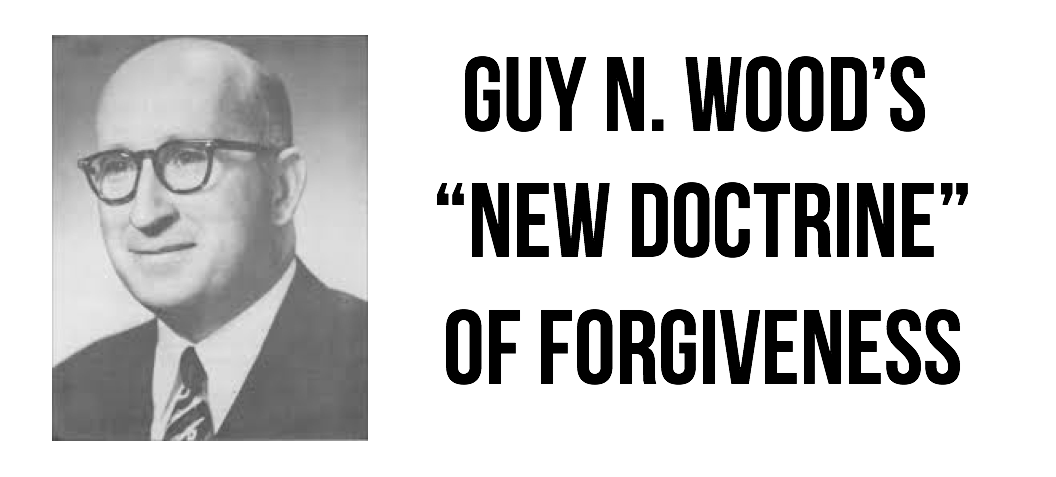



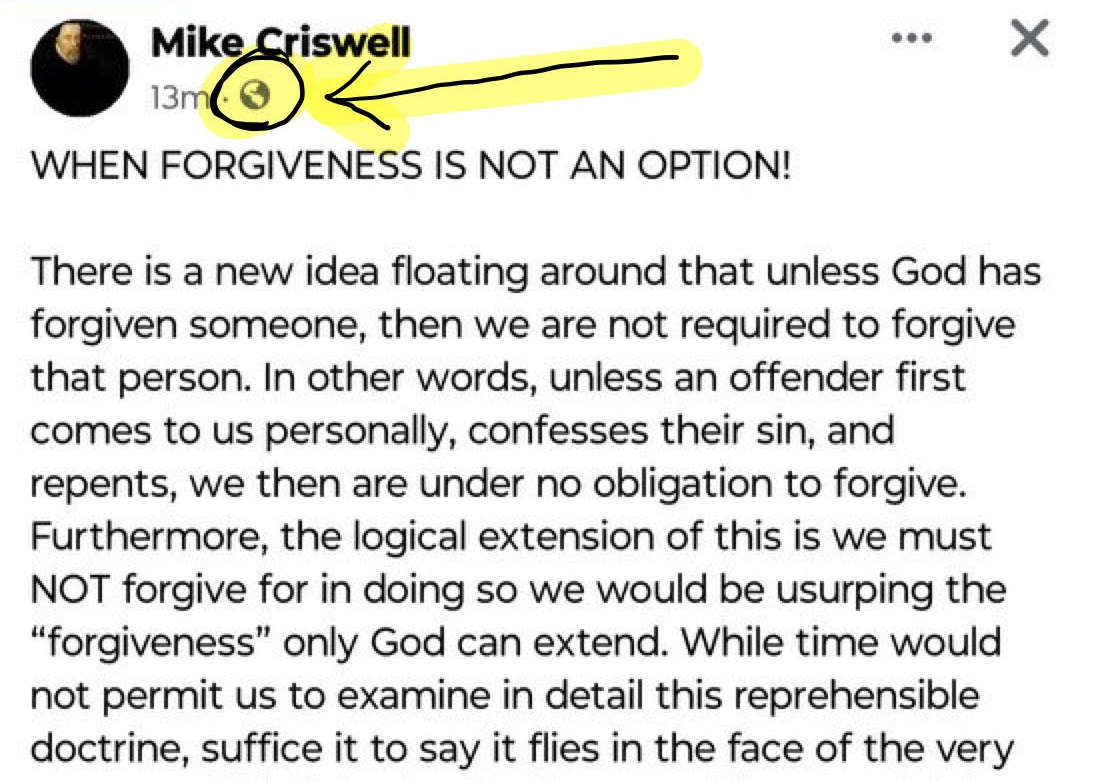
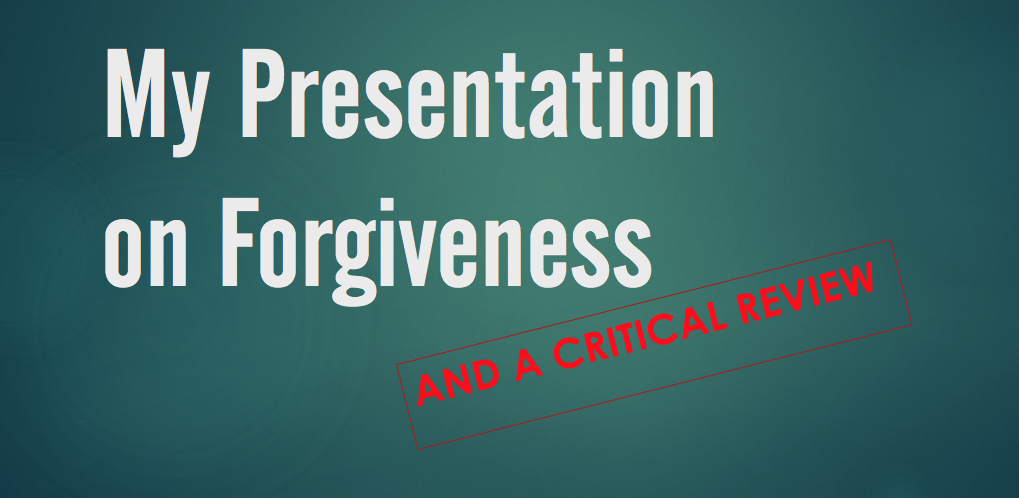
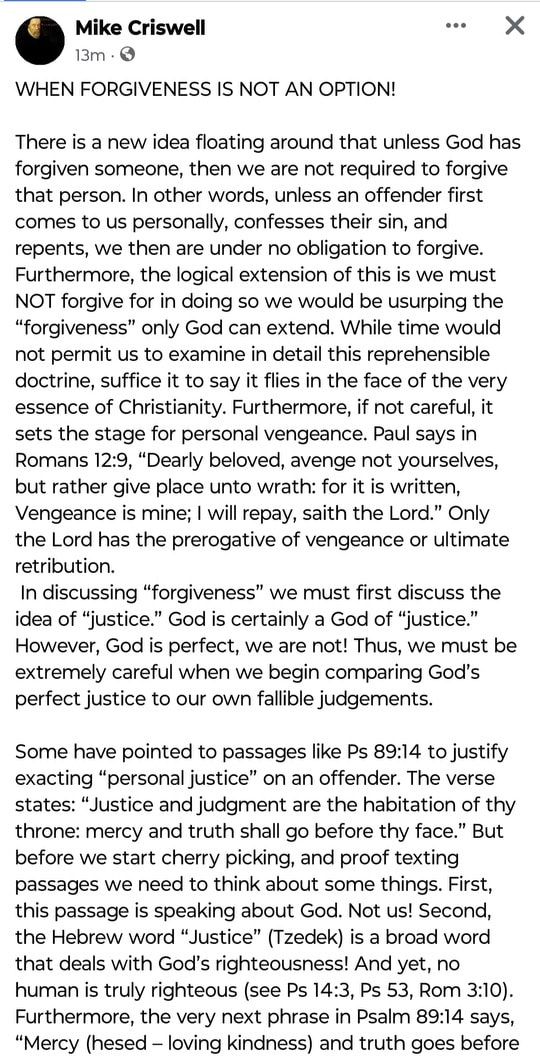
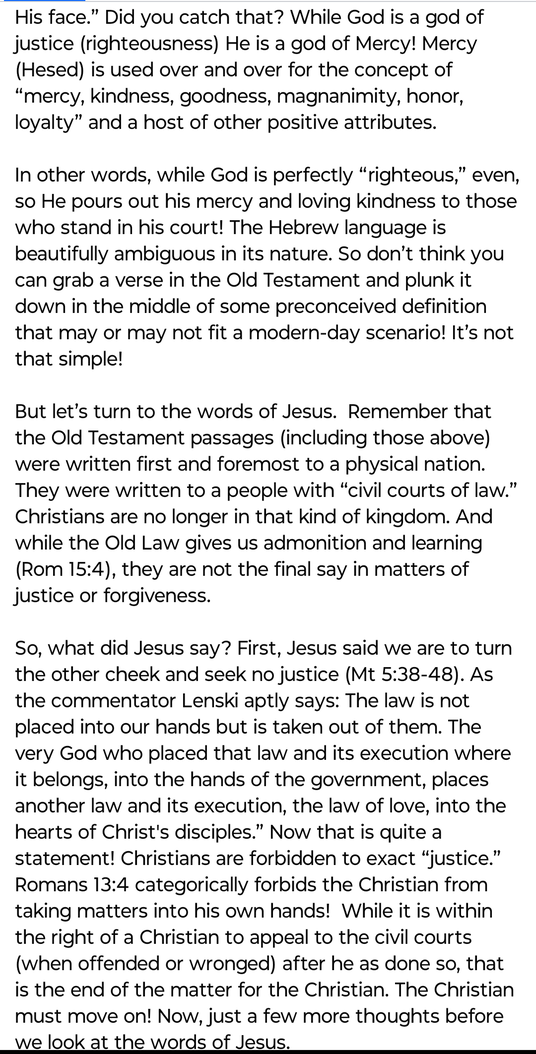
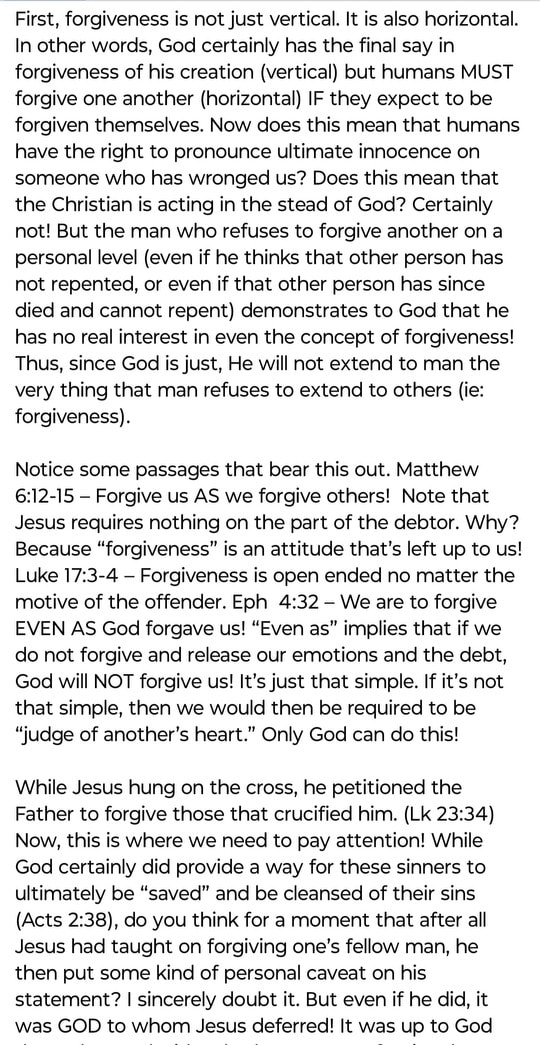
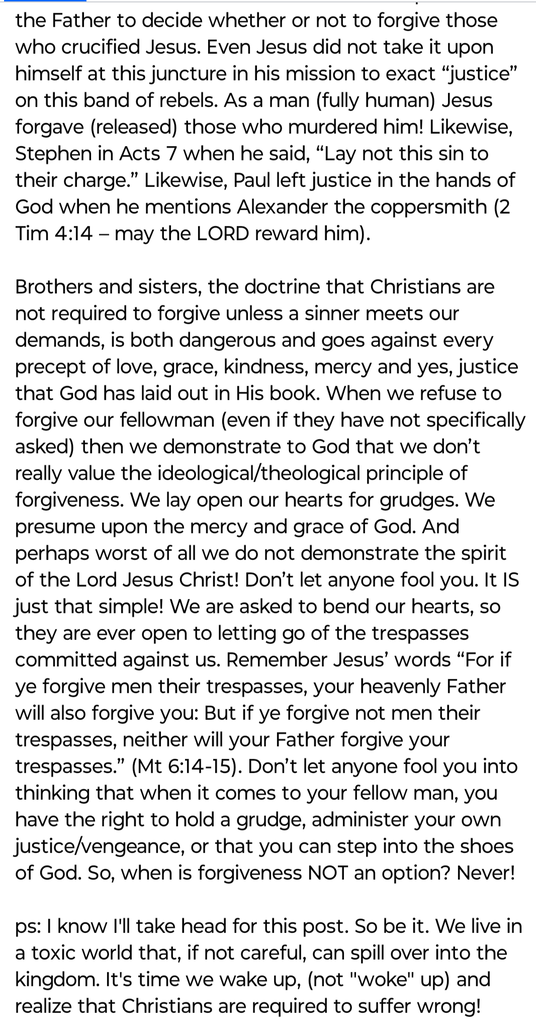

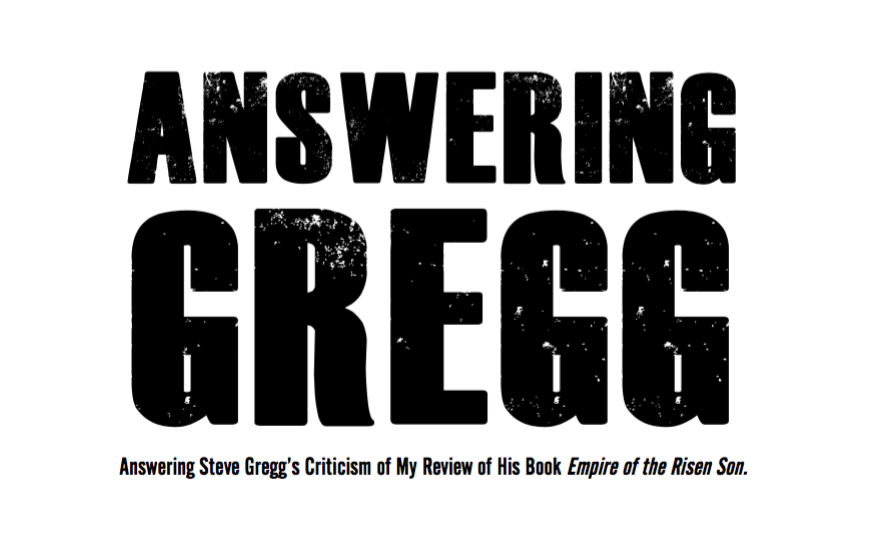
 RSS Feed
RSS Feed
